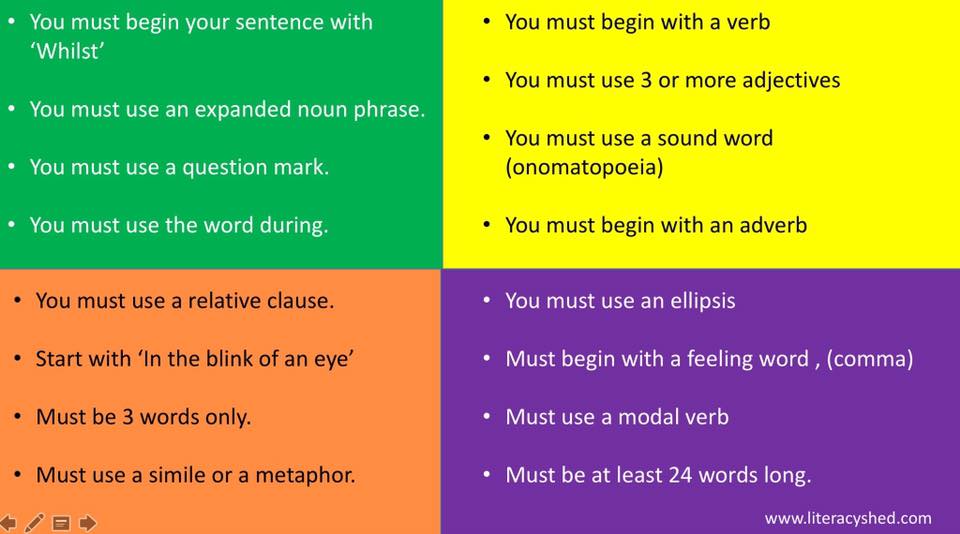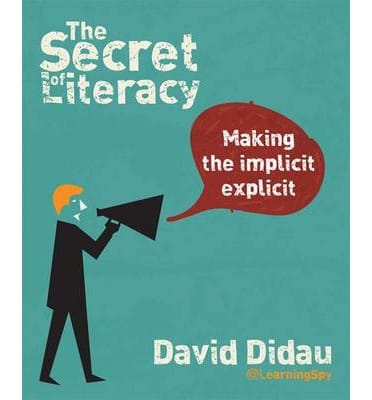|
I first heard about Slow Writing at a #researched session delivered by David Didau, @learningspy when he talked about asking children to slow down when writing, cut the waffle and focus on every single word or sentence that they construct. I went away and read all he had written about Slow Writing on his blog where he has now helpfully grouped all the slow writing blogs.
I have used Slow Writing successfully over and over again. I have recommended it to many schools who also feedback that it has 'transformed' writing for some children. New to slow writing? Just start with 6 - 8 prompts. Allow no choice. This makes it a constrained piece and children have to really think about each and every sentence in the paragraph. An example may be: 1. Your sentence must start with a verb. 2. Your sentence must contain a simile 3. Your sentence must use a relative clause. 4. Your sentence must be 3 words only. 5. Your sentence must use start with a time phrase. 6. Your sentence must use a modal verb. Don't just copy and paste this one but think about what you want your pupils to achieve in that single paragraph. With slow writing it is about quality and not quantity. Get the children to work double spaced and then go back and edit these six sentences until 'perfect' (or as close as they can get). Once they are familiar with this concept they can choose the order or you can increase the number of prompts and allow them to choose from the list. You can see an example of it in action here: Chaperon Rouge Blog "But this isn't independent!" "Moderators won't like it..". You may say. However, this is not for moderators, it isn't for teacher assessment. This is to allow children to practise their skills, which hopefully they will then use in their independent writing. Slow writing can be differentiated. You could make a number of lists dependent on ability or once children are familiar with the concept you could give them a choice of options. See diagram below. Green: Y3 objectives. Yellow Y4 objectives. Orange Y5 objectives. Purple Y6 objectives. The children in this mixed-age/mixed-ability class were allowed to start where they wanted although the class teacher did guide some pupils as required. As always I look forward to receiving comments. Rob
10 Comments
steve
8/1/2017 07:46:42 pm
Really good I like this idea - it builds on some work I have been doing with my year 10 Biology students about crafting their responses so that they are the very best they can be. I'm going to modify the resources in this article - I have also been so surprised when looking at work from year 8 students by the way they focus on quantity rather than quality. It seems that at secondary the mantra from teachers that we have to plough through the curriculum comes at a cost to the students development of literacy. Ironically sometimes in life less is more. Thanks for sharing the ideas😊
Reply
Sarah
15/1/2017 07:52:04 am
Hi there, I am very interested in giving this a try with a year 5 intervention group. I think the structured approach will help them to produce a piece of writing they can be proud of. Can you give me some suggestions as to what you would use as a stimulus for their writing? Thanks again.
Reply
Andy Hawley
5/2/2017 10:29:29 pm
Sarah,
Reply
Sarah
6/2/2017 06:46:18 am
Thanks Andy. That's really useful. I'll give it a go after half term! Thanks for the suggestion. Sarah 19/1/2017 06:04:15 am
The slow writing ink project has evolved from a deeply held belief that over-consumption and a lack of awareness of provenance has caused the important things in life to lose value. we acquire things so very easily, without thought of where they came from or where they’ll go when we’ve finished with them.
Reply
Jo Williams
5/2/2017 09:25:33 am
I have developed this approach for children who are having intervention in years one and two (thinking it was unique, until I saw this!). I use VCOP as a starting point, give the children a simple sentence and they work through the sentence improving this as they go.
Reply
Hayden Vick
13/3/2017 11:01:01 pm
Hey Rob,
Reply
Hannah
11/9/2017 09:32:30 pm
Hello,
Reply
Leave a Reply. |
Archives
July 2020
Categories
All
|



 RSS Feed
RSS Feed
